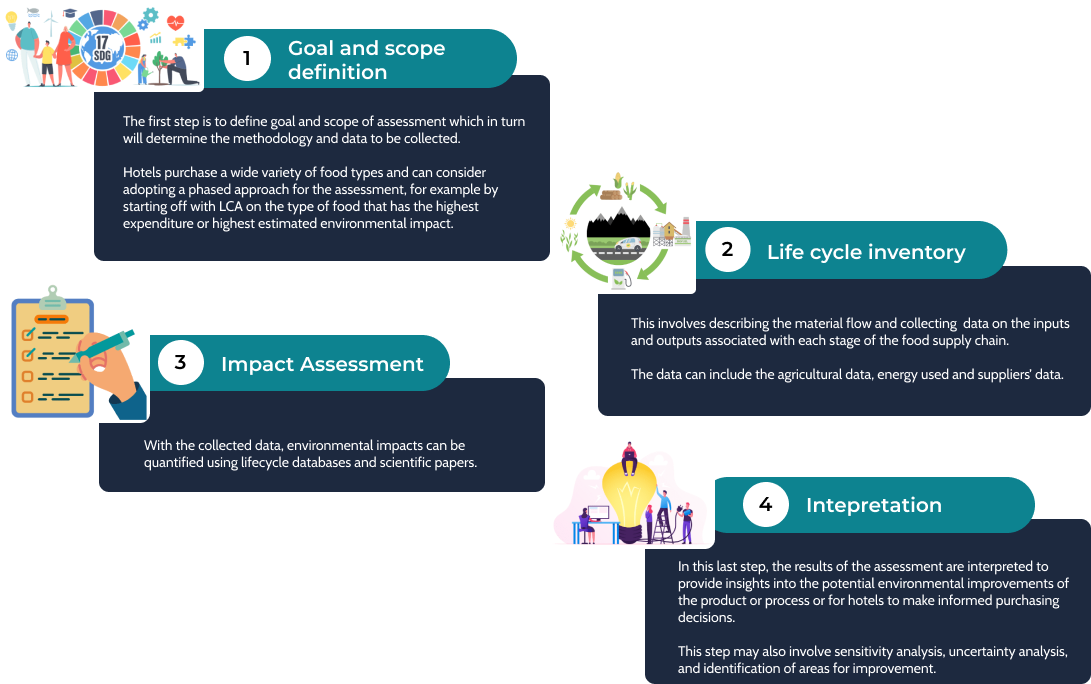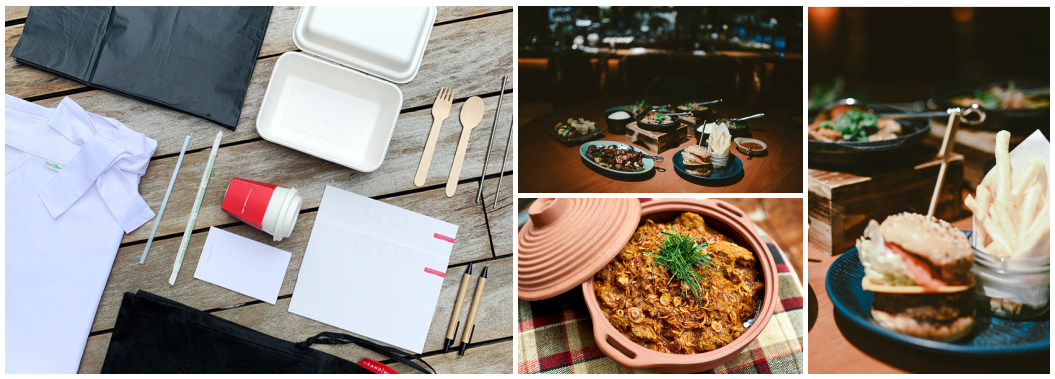
Consumers today are increasingly aware and concerned about the environment and socio-economic impacts of the products they purchase. They want to know information on where the products they purchase come from and what they are made of.
Food production has a significant impact on the environment, from deforestation and greenhouse gas emissions to water pollution and soil degradation. The food we eat and the way we produce and distribute food can either accelerate or slow climate change.
Hotels, being one of the key stakeholders in the food industry will have a significant role to play in sustainable food sourcing practices. By adopting sustainable sourcing practices, hotels can ensure that their purchasing decisions do not cause any indirect negative impact to the environment and any cause socio-economic issues.
To fully understand the environmental impacts of the purchased food, one can conduct a life cycle assessment (LCA). LCA is a methodology for evaluating and quantifying the environmental impact of the food through its life cycle encompassing production, transportation, storage and consumption. Through LCA assessment, hotels can gain valuable insights on which product or services have the most significant impact and strategically develop effective solutions to mitigate their negative impact.
Some of the common solutions include:
|
| Solutions: Purchase from suppliers who are eco-conscious or products that minimize harm to environment, source locally where feasible, improve planning process to prevent excessive purchasing |
| Educate:
Educational engagements with staff and guests on sustainable sourcing behaviors | |
| Monitor and Review: Continue assessment of the goods and services purchased to effectively manage hotel’s impacts on the value chain in a strategic and orderly manner |
Considering the existential threat posed by climate change, it is imperative that hotels incorporate sustainable sourcing into their procurement framework. In addition, this will help to set hotels apart from their competitors and appeal to consumers who are increasingly concerned about the environmental impact of their travel choices.
In this section, we will be focusing on sustainable sourcing for food management.
The sustainable sourcing best practices for events management will be similar to Operations Management – Sustainable Sourcing & Procurement section.
Global Best Practices
General Audit
Life Cycle Assessment (LCA) is a powerful tool to provide hotels with a comprehensive picture of the environmental impact of their purchased food for the hotel’s F&B operations.
By analysing the environmental impact of each stage of the food supply chain, it provides insights on the greenhouse gas emissions, water usage, and waste generation associated with the procured food. Armed with this knowledge, hotels can make strategic decisions about their procurement practices and choose products and services that have a lower environmental impact.
The LCA methodology mainly consist of 4 steps. Some of these steps may vary in different industries and sectors, however, the general flow remains the same.

References: How to conduct a useful Life Cycle Assessment (greenly.earth) | Life Cycle Assessment (LCA) - Complete Beginner's Guide (ecochain.com)
Solutions
Sustainable sourcing reduces carbon footprint of the hotel and at the same time promotes social responsibility by supporting local communities. Moreover, implementing sustainable sourcing practices can also promote sustainable business practices. With increasing number of guests becoming more environmentally conscious, hotels that adopt sustainable sourcing practices will have a competitive advantage.
To successfully implement sustainable sourcing, hotels can develop a supply chain policy with a policy statement that outlines hotel’s vision, principles, and guidelines for sustainable sourcing.
Some action plans hotels can consider are:

Education
Case Studies
International
Grand Hyatt - Sustainable Sourcing

Grand Hyatt is dedicated to promoting responsible sourcing of products and services to tackle issues such as climate change, deforestation, human rights, waste, public health, resource scarcity, biodiversity, and animal welfare. In response to the evolving world and emerging challenges, Hyatt has launched its global Environmental, Social and Governance (ESG) strategy through the World of Care platform. Grand Hyatt is also committed to providing healthy options for guests to support their well-being. With the hotel's food and beverage philosophy, "Food. Thoughtfully Sourced. Carefully Served.," it guides the menu design to better serve guests, communities, and most importantly generating a positive impact on our planet. Hyatt was the first multinational hotel company to collaborate with the World Wildlife Fund (WWF) at the global level and take a leading role in sustainable seafood. The company is committed to increase responsibly sourced seafood, with a focus on Marine Stewardship Council (MSC) or Aquaculture Stewardship Council (ASC) certifications. Hyatt is also dedicated to collaborating with all managed and franchised hotels worldwide to source cage-free eggs, with a goal of sourcing 100% cage-free shell eggs and egg products globally by the end of 2025. In 2021, 57% of the shell eggs and 52% of the egg products used in managed hotels in the U.S. were cage-free. Meanwhile, 36% of eggs used in franchised hotels in the U.S. were cage-free, and 51% of eggs in Western Europe were cage-free, based on available data. Hyatt has been annually reporting on cage-free egg products and is continually working to expand the regional and franchise representation in these annual updates. The goal includes hotels affiliated with Apple Leisure Group, which was acquired by Hyatt in November 2021. Hyatt and Hyatt Hotels are promoting responsible consumption through well-considered purchasing decisions, including an increase in Forest Stewardship Council (FSC)-certified or recycled content paper products. Besides, the hotels have also implemented circular economy considerations by sourcing reusable items, products made from post-consumer recycled materials, and items that are readily recyclable or compostable. In 2018, Hyatt became a signatory of the World Travel and Tourist Council Declaration on Illegal Trade in Wildlife to combat the exploitation of vulnerable species and protect wildlife. References: Responsible Sourcing | Hyatt World of Care | 2021WOCHighlights.pdf (hyatt.com)
Local
Resort World Sentosa (RWS)- Sustainable Procurement

Sustainable procurement forms an integral part of RWS’ 2030 Sustainability Master Plan, and its strategy is enshrined in its Sustainable Procurement Policy. RWS puts focus on reducing social and environmental impacts through responsible sourcing efforts, such as identifying sustainable sources for key material categories and purchasing locally produced goods and services.
This approach is exemplified in RWS’ F&B establishments. At Ocean Restaurant for example, seafood is sourced from certified fisheries that practice responsible and efficient management of marine resources with minimal environmental impact. The resort's overall seafood sourcing exceeds RWS’ initial target of 63%, with 70% of seafood responsibly sourced. Looking beyond food sources, RWS has also incorporated elements of responsible sourcing in the refurbishment of the restaurant, swapping to a certified environmentally friendly premium alternative to timber for the ceiling and wall finishes and using stone tiles made with up to 40% recycled materials.
TRWS has also received recognition for its efforts in local sourcing, becoming one of the first and largest highest-tier recipients of the Singapore Food Agency (SFA)'s Farm-to-Table Recognition Programme, which recognises food businesses that procure at least 15% of local produce in any of the four food categories - hen shell eggs, leafy vegetables, beansprouts, and fish - for their food menu. Beyond supporting homegrown businesses, sourcing locally can reduce the carbon emissions otherwise generated from importing goods from overseas.
Marina Bay Sands - Sustainable Procurement Policy

MBS is committed to sustainable sourcing and procurement processes through the Las Vegas Sand’s Sustainable Procurement Policy. The Policy requires MBS to procure environmentally preferable and socially responsible products, raise staff’s awareness on sustainable sourcing and procurement, encourage suppliers to provide sustainable options, and comply with legal requirements in the procurement of products and services.
MBS prioritises the procurement of sustainable seafood for their restaurants and create region-specific sustainability strategies guided by international standards and in partnership with leading non-governmental organisations like WWF-Singapore.
In 2017, MBS entered a landmark partnership with WWF-Singapore to improve sustainable seafood sourcing within Asia’s hospitality industry, starting with ocean conservation. Through the partnership, they have jointly developed measurable and achievable goals to improve responsible procurement within the Integrated Resort and transform its supply chain. This partnership is aligned with MBS’s global sustainability strategy – Sands ECO360°, which drives the stewardship of responsible business in the areas of green building, environmentally responsible operations, green meetings and sustainability education and outreach.
The goals of the partnership cover 2 key areas:
(1) Responsible Seafood: MBS procured targeted priority seafood species from Marine Stewardship Council (MSC) and Aquaculture Stewardship Council (ASC) certified sources, removed seafood from the avoid list of WWF’s Seafood Guide across its F&B operations. Additionally, they have a target to responsibly source 45% of all seafood by volume by 2023 and expand traceability programme with DNA testing and product trackbacks.
(2) Aquaculture Improvement Projects (AIPs): MBS collaborated with 9 aquaculture farms across Malaysia and Singapore in their transition towards sustainable farming and funded research on Artificial Intelligence (AI) application for fisheries in the Great Barrier Reef and aquaculture farming practices in Vietnam.
Through these initiatives, MBS have improved the traceability of the seafood supply, reduced unsustainable seafood sourcing costs, as well as contributed to ocean conservation efforts through supporting aquaculture farms. For the AIP farms, there was an increase in the production of responsible seafood from 320 tonnes in 2018 to 687.5 tonnes in 2021. The number of AIP farms in Malaysia and Singapore have also increased from 4 in 2017 to 9 in 2023.
MBS’s Sustainable Procurement Policy has led to other benefits like driving economies of scale during procurement for suppliers and encouraging vendors to innovate and provide specialty, custom-designed products for MBS. Additionally, the Supplier Food Quality Programme ensures better production and quality of food supplies received from suppliers. Ultimately, MBS is committed to benefitting the community and local enterprises by awarding most procurement contracts to Singapore-based companies.
Monitor & Review
Regular review of Life Cycle Assessment (LCA) can be an effective way for hotels to ensure that their environmental impact assessments remain current and relevant. This is crucial as it allows hotels to identify areas that require improvement and implement strategies to minimize negative environmental impacts. However, the frequency of reviewing LCA can vary and depends on various factors such as changes in any stage of the life cycle, updates to regulations, and specific sustainability goals and objectives of each hotel.
To achieve continuous improvement, hotels must continually review and enhance their sustainable sourcing strategies. This will enable them to stay up to date with the latest sustainability practices and adapt to changes in the industry. By doing so, hotels can not only minimize their negative impact on the environment but also increase their positive impact on the community and the planet.
